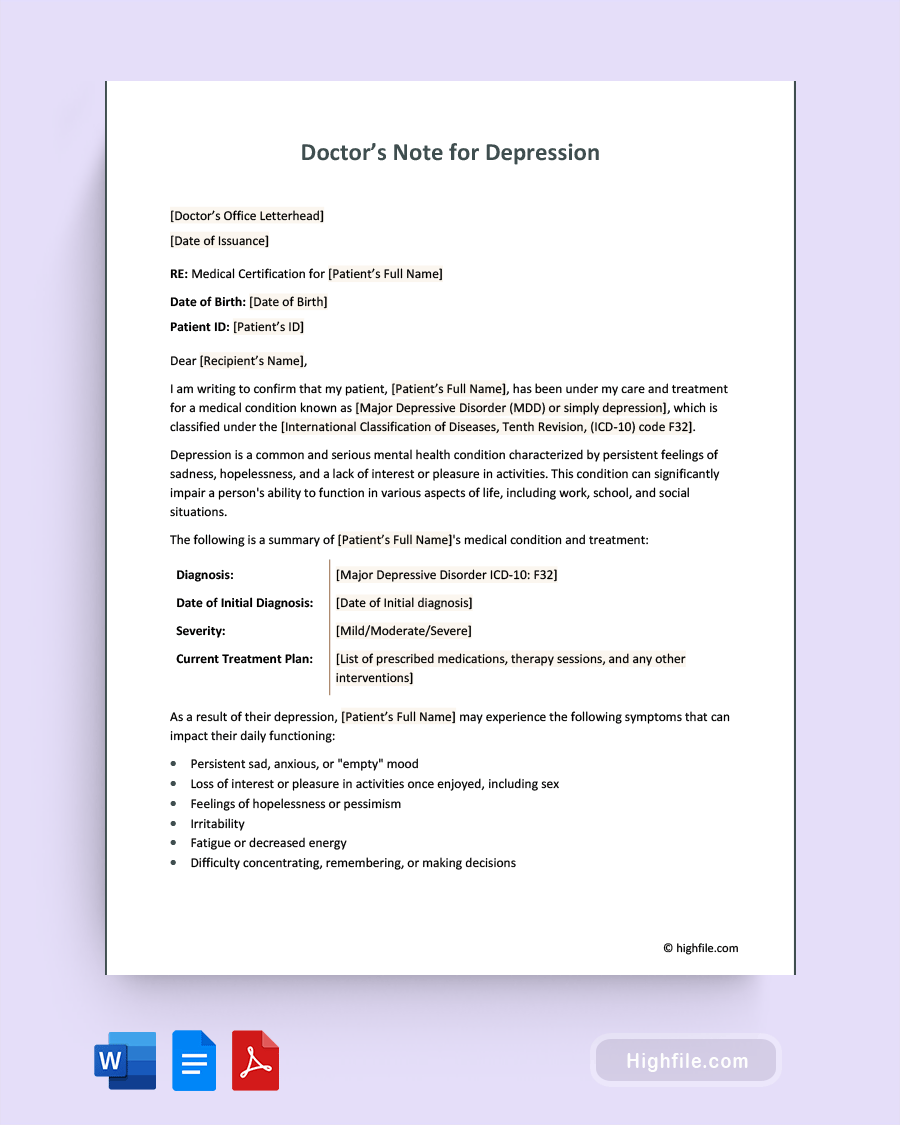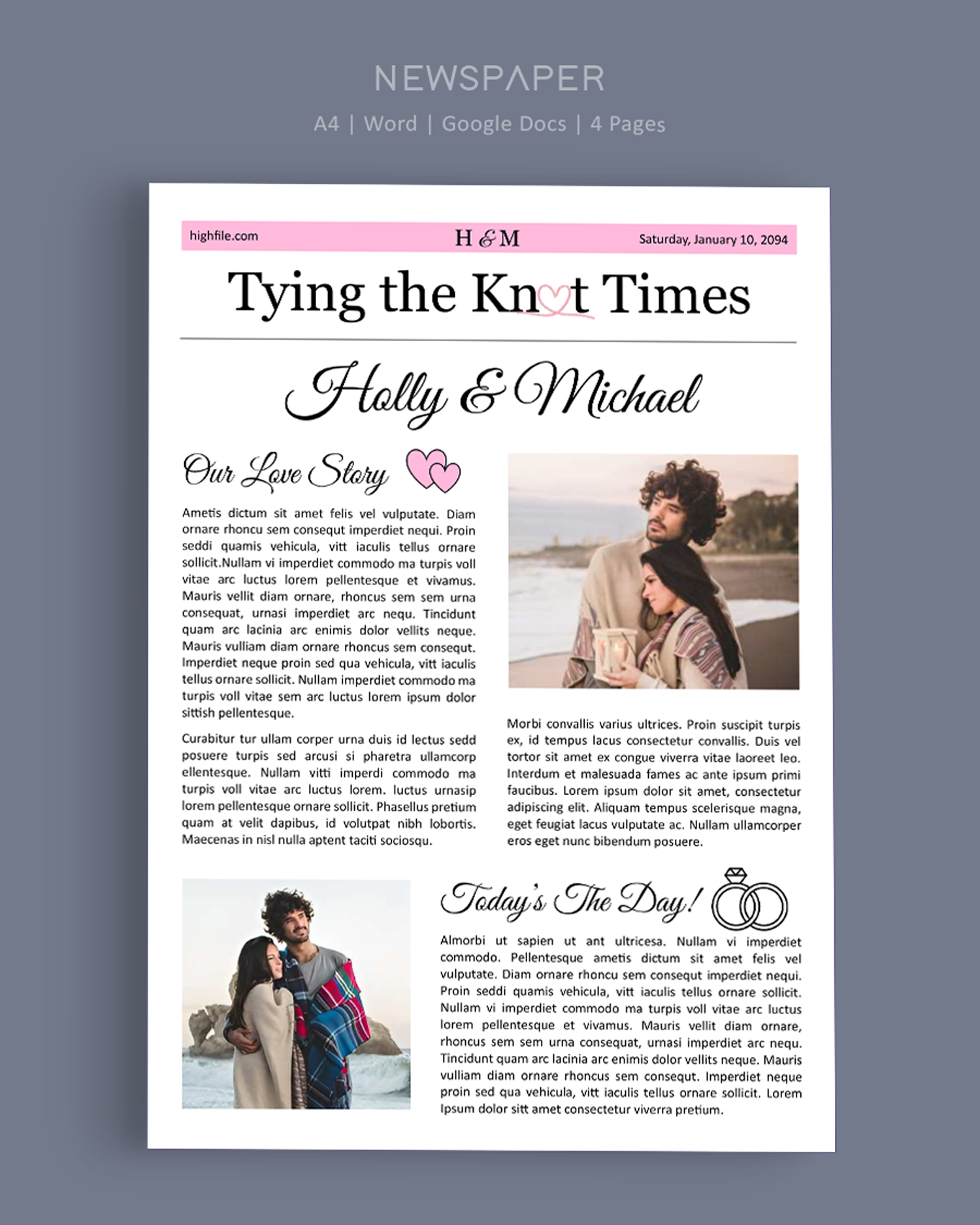Patients need a doctor’s note for depression for many reasons, such as providing proof of their condition to their employer, school, or insurance provider. The note can help to establish the need for accommodations or time off work for medical treatment. Sometimes, a doctor’s note for depression may also be required for legal or disability-related purposes. This can benefit patients by helping them access the support and accommodations they need to manage their depression. It can also remind them of their treatment plan and the importance of caring for their mental health. Additionally, a doctor’s note for depression can help reduce mental health stigma by normalizing the need for medical treatment and support.
What Is a Doctor’s Note for Depression?
A doctor’s note for depression is a written document that confirms an individual’s diagnosis of depression and provides information about their treatment plan. It can be used to demonstrate that the person is suffering from a medical condition and may require accommodations or restrictions at work, school, or other settings. The note typically includes details about the individual’s symptoms, medication, and any necessary adjustments to their activities or responsibilities.
Fun Fact: Some doctors notes for depression are used to obtain emotional support animals (ESAs).
When a Doctor’s Note for Depression is Needed?
A doctor’s note for depression can play an essential role in helping patients with mental health conditions receive the support and accommodations they need to manage their symptoms and improve their overall well-being. This document is vital when a patient’s mental health condition needs to be documented and verified. Here is a list of situations where a doctor’s note for depression may be required:
- Medical leave: A doctor’s note for depression may be necessary if a patient needs to take a medical leave from work or school due to their mental health condition.
- Work and school accommodations: A doctor’s note for depression may be needed if a patient requires accommodations at work or school, such as reduced hours or workload, modified responsibilities, or other adjustments to their environment or tasks.
- Fitness for duty evaluations: A doctor’s note for depression may be required if a patient’s ability to perform their job duties or meet certain standards of fitness for duty is called into question.
- Legal proceedings: A doctor’s note for depression may be needed in legal proceedings, such as disability hearings, workers’ compensation claims, or other legal cases where a patient’s mental health condition is relevant.
- Insurance: A doctor’s note for depression may be required by insurance companies to support a patient’s claim for coverage or reimbursement for mental health treatment.
- Disability hearings: A doctor’s note for depression may be necessary to support a patient’s application for disability benefits based on their mental health condition.
Important Note: Make a digital copy of your note. Doing this can help in case the note is lost, stolen, or misplaced.
Essential Elements of Doctor’s Note for Depression
By including these essential elements, a doctor’s note for depression can provide the necessary information to support a patient’s needs and help them manage their mental health condition. Here is a list of essential elements that should be included in a doctor’s note for depression:
- Letterhead: The letterhead should have the doctor’s name, address, phone number, and email address.
- Date: The date the letter was issued.
- Introductory Information: Include the patient’s name, date of birth, and patient number (if applicable). It should also include a reference line indicating the purpose of the note, such as “Re: Medical Leave Request.”
- Salutation: A formal salutation, such as “Dear [Recipient’s Name],” should be included.
- Introductory Paragraph: State the purpose of the note and provide some context for the patient’s mental health condition.
- Paragraph about Diagnosis: This section should include a clear and concise statement of the patient’s diagnosis and its impact.
- Summary of Medical Condition and Treatment: Relevant details about the patient’s medical condition, including the initial date of diagnosis, the severity of the condition, and the treatment plan.
- Side Effects List: If there are any side effects associated with the patient’s medication or treatment plan, these should be listed.
- Need for Accommodation Paragraph: This section should explain any accommodations the patient may require, such as modified work hours or duties, to manage their mental health condition.
- List of Recommended Accommodations: Provide a specific list of the patient’s required accommodations.
- Closing Paragraph: In closing, indicate that the patient’s mental health condition may require ongoing monitoring and adjustment over time.
- Thanks: A thank you note for considering the patient’s needs should be included.
- Formal Closing: A formal closing, such as “Sincerely,” should be included.
- Doctor Name, Title, and Contact Information: The doctor’s name, title, and contact information should be included at the end of the note.
Pro Tip: Always be honest about your depression with your doctor. They need accurate information to help you.
FAQs
When requesting a doctor’s note for depression, mentioning specific symptoms you are experiencing is vital. These may include feelings of sadness or hopelessness, loss of interest in activities you once enjoyed, changes in appetite or sleep patterns, difficulty concentrating, fatigue or low energy, and thoughts of self-harm or suicide. By sharing these details with your healthcare provider, they can better assess your condition and provide appropriate treatment recommendations.
Employees who present a doctor’s note for depression may be protected under the Americans with Disabilities Act (ADA) and other anti-discrimination laws. These laws prohibit employers from discriminating against individuals with disabilities, including mental health conditions like depression. Employers may be required to provide reasonable accommodations, such as flexible work hours or a modified workload, to enable employees to perform their job duties despite their condition. If an employer retaliates or discriminates against an employee for requesting a doctor’s note or taking time off for treatment, the employee may have legal recourse.
A therapist or counselor may be able to issue a doctor’s note for depression. It ultimately depends on the specific requirements of the organization or institution requesting the note. Sometimes, the organization may require a note from a licensed psychiatrist or medical doctor. However, a note from a licensed therapist or counselor may be sufficient in other situations.
It’s important to note that while therapists and counselors can provide mental health treatment and support, they cannot prescribe medication like psychiatrists can. So if medication is a necessary component of your treatment plan, you may need to consult with a psychiatrist or medical doctor in addition to your therapist or counselor.
Key Points
A doctor’s note for depression is a medical document that verifies a patient’s mental health condition and provides information about their ability to perform daily activities, including work or school. The note typically includes the patient’s diagnosis, treatment plan, and recommended accommodations, if applicable. Using a template for a doctor’s note for depression can help ensure that important information is included in the note, such as the patient’s diagnosis and recommended accommodations. It can also save time for healthcare providers, allowing them to focus on providing quality care to their patients instead of spending excessive time on administrative tasks. Additionally, a standardized template can help ensure consistency in documentation and reduce the risk of errors or omissions in the note.







